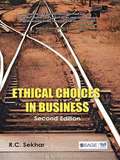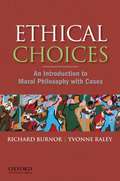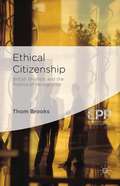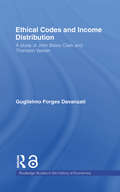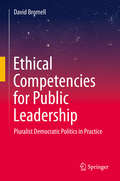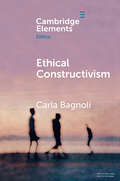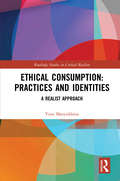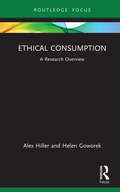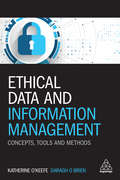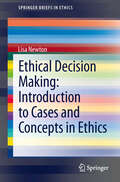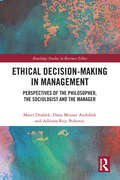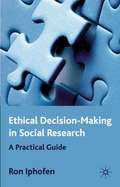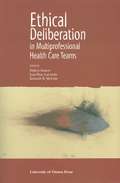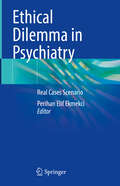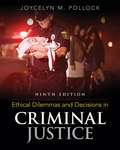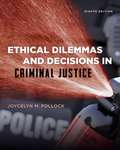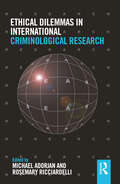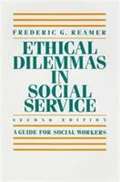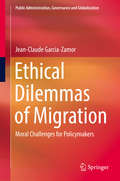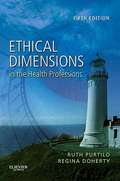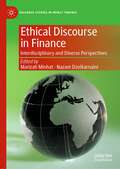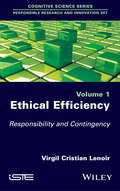- Table View
- List View
Ethical Choices in Business
by S C SekharPraise for the First Edition: '... a unique and lively business ethics text... fresh and delightful... Sekhar's witty use of stories and cases will engage and enlighten business people in India and the rest of the world' - Joanne B Ciulla, The Journal of Business Ethics 'Richly international in scope and contributes to global concern' - Newsltter IIAS Leiden University 'This book makes an important contribution through its holisitc and balanced approach to the issue... Each chapter has a fair number of relevant cases - many of which are good living examples one can learn from' - Business Standard Ethical Choices in Business is a highly successful text on the principles and practice of business ethics. The second edition of the universally acclaimed book explores the various facets of business ethics that involve the individual, the organisation and the society. With a wide socio-economic canvas, the book delves into: - Evolution of ethical values, - Integrating personal and other ethics, - Law and ethics, - Ethics and corporate governance, - Ethics and human resource management, - Problems in whistle-blowing, - Consequences of corruption, - Environmental ethics, - Ethics and gender balance, and much more. Written in an engaging manner, with cases, exercises, questionnaires, quotes and stories, this book is a very accessible resource for professionals and scholars who want to understand and emphasise ethical choices in their personal, professional and social domains.
Ethical Choices: An Introduction To Moral Philosophy With Cases
by Richard Burnor Yvonne RaleyIdeal for students with little or no background in philosophy, Ethical Choices: An Introduction to Moral Philosophy with Cases provides a concise, balanced, and highly accessible introduction to ethics. Featuring an especially lucid and engaging writing style, the text surveys a wide range of ethical theories and perspectives including consequentialist ethics, deontological ethics, natural and virtue ethics, the ethics of care, and ethics and religion. Each chapter of Ethical Choices also includes compelling case studies that are carefully matched with the theoretical material. Many of these cases address issues that students can relate directly to their own lives: the drinking age, student credit card debt, zero tolerance policies, grade inflation, and video games. Other cases discuss current topics like living wills, obesity, human trafficking, torture "lite," universal health care, and just-war theory. The cases provide students with practice in addressing real-life moral choices, as well as opportunities to evaluate the usefulness and applicability of each ethical theory. Every case study concludes with a set of Thought Questions to guide students as they reflect upon the issues raised by that case. Ethical Choices is enhanced by several pedagogical features. These include summaries at the end of each section, lists of key terms, questions For Reflection and Discussion at the end of each chapter,Guidelines for a Case Study Analysis,and suggestions For Further Reading that include Internet sources. Starred sections indicate more advanced material that may be included at the instructor's discretion.
Ethical Citizenship
by Thom BrooksCitizenship has come under increasing strain in the face of globalization. Our world gets ever smaller while it sometimes seems our borders are becoming ever more closed. What is citizenship and how can it be ethical? Should citizens owe each other special duties denied to non-citizens? How might theories about citizenship impact on our practices? Ethical Citizenship rediscovers a significant and distinctive contribution to how we might understand citizenship today in the first full length examination of this topic. Ethical citizenship is a communitarian relationship between members of a community based around a shared conception of the common good first defended by British Idealists. This book explores its historical roots, contemporary relevance and application to international politics in an engaging work by leading international scholars bringing together theory and practice.
Ethical Codes and Income Distribution: A Study of John Bates Clark and Thorstein Veblen (Routledge Studies in the History of Economics #Vol. 79)
by Guglielmo Forges DavanzatiIn contemporary non-mainstream economic debate, it is widely thought that the functioning of a market economy needs a set of rules (i.e. institutions) which bind agents in their behaviour, allowing efficient outcomes. This idea is contrary to the General Equilibrium Model (GEM) where markets are pictured as working in an institutional vacuum and where social and historical variables play no role. However, in more recent times, a large group of economists have begun to insert social and moral variables into standard models based on the rational choice paradigm, following the increasing interest – on the part of firms – in the possible positive effects of adopting ethical codes. In this key new text Guglielmo Davanzati studies this burgeoning view that ethics and economics can be compatible. Does ‘morality’ affect income distribution? And, if so, what are the effects of the widespread adoption of ethical codes on the functioning of the labour market? Central to Davanzati’s efforts is the thesis that the roots of these new developments can be traced back to the pioneering work of Thorstein Veblen and John Bates Clark. Utilizing their contrasting works, Davanzati’s text illuminates the propagation of ethical codes within the two opposing frameworks i.e. the neoclassical and the institutional. Davanzati’s important book will be an invaluable reference for readers interested in history of economic thought, economics and moral philosophy.
Ethical Competencies for Public Leadership: Pluralist Democratic Politics in Practice
by David BromellThis book identifies six ethical competencies for public leadership in contexts of pluralism. While diversity in proximity generates conflict where people want and value different things, the right kind of leadership and the right kind of politics can minimise domination, humiliation, cruelty and violence.Written by a public policy advisor for fellow practitioners in politics and public life, this book applies political theory and social ethics to identify a set of competencies—being civil, diplomatic, respectful, impartial, fair and prudent—to keep ethics at the centre of a pluralist democratic politics. The six competencies are described in behavioural terms as personal resolutions. They offer valuable tools for mentoring and professional development.This book will appeal to politicians and those who advise them, and anyone who engages in or aspires to public leadership, whether in the public sector, the private sector, the community and voluntary sector or academia.
Ethical Constructivism (Elements in Ethics)
by Carla BagnoliEthical constructivism holds that truths about the relation between rationality, morality, and agency are best understood as constructed by correct reasoning, rather than discovered or invented. Unlike other metaphors used in metaethics, construction brings to light the generative and dynamic dimension of practical reason. On the resultant picture, practical reasoning is not only productive but also self-transforming, and socially empowering. The main task of this volume is to illustrate how constructivism has substantially modified and expanded the agenda of metaethics by refocusing on rational agency and its constitutive principles. In particular, this volume identifies, compares and discusses the prospects and failures of the main strands of constructivism regarding the powers of reason in responding to the challenges of contingency. While Kantian, Humean, Aristotelian, and Hegelian theories sharply differ in their constructivist strategies, they provide compelling accounts of the rational articulation required for an inclusive and unified ethical community.
Ethical Consumption: A Realist Approach (Routledge Studies in Critical Realism)
by Yana ManyukhinaThis book engages with the topic of ethical consumption and applies a critical-realist approach to explore the process of becoming and being an ethical consumer. By integrating Margaret Archer’s theory of identity formation and Christian Coff’s work on food ethics, it develops a theoretical account explicating the generative mechanism that gives rise to ethical consumer practices and identities. The second part of the book presents the findings from a qualitative study with self-perceived ethical food consumers to demonstrate the fit between the proposed theoretical mechanism and the actual experiences of ethically committed consumers. Through integrating agency-focused and socio-centric perspectives on consumer behaviour, the book develops a more comprehensive and balanced approach to conceptualising and studying consumption processes and phenomena.
Ethical Consumption: A Research Overview (State of the Art in Business Research)
by Helen Goworek Alex HillerArising from foundations in green and eco-consumerism, ethical consumption is a multidisciplinary area of research. This shortform book presents an expert view of the empirical evidence on ethical consumption, incorporating perspectives from marketing, psychology and sociology. It takes both a historical and a thematic perspective, covering definitions of ethical consumption, typologies of ethical consumer practices, successes brought about from consumer actions and the current challenges. It also focuses on the emergence of contemporary perspectives on ethical consumer behaviour from three discrete perspectives: those focusing on consumer segmentation (the profiling of ethical consumers), those which take a psychological approach (the decision- making processes which underpin ethical consumption) and those which are sociological in nature (the identities and practices which underpin ethical consumption). The book finally synthesises these perspectives in the context of the ‘problems’ that are often claimed to exist, such as the existence of the ‘attitude– behaviour gap’, and provides conclusions which make recommendations for practice and further research. It will be of interest to academics and students of marketing, consumption and related fields, as well as to practitioners and policymakers who want to understand more about the evidence pertaining to ethical consumers, what motivates them, and how to encourage and educate them to consume more ethically.
Ethical Data and Information Management: Concepts, Tools and Methods
by Katherine O'Keefe Daragh O BrienInformation and how we manage, process and govern it is becoming increasingly important as organizations ride the wave of the big data revolution. Ethical Data and Information Management offers a practical guide for people in organizations who are tasked with implementing information management projects. It sets out, in a clear and structured way, the fundamentals of ethics, and provides practical and pragmatic methods for organizations to embed ethical principles and practices into their management and governance of information. Written by global experts in the field, Ethical Data and Information Management is an important book addressing a topic high on the information management agenda. Key coverage includes how to build ethical checks and balances into data governance decision making; using quality management methods to assess and evaluate the ethical nature of processing during design; change methods to communicate ethical values; how to avoid common problems that affect ethical action; and how to make the business case for ethical behaviours.
Ethical Decision Making: Introduction to Cases and Concepts in Ethics
by Lisa NewtonThis short introduction to the discipline of Ethics in its practical and professional applications teaches, in simplest form, the discipline's vocabulary and forms of reasoning. It includes illustrative cases, clear explanations of philosophical terminology, and presents decision procedures appropriate to a hierarchy of cases. It is meant to be a foundation for elementary work in Ethics.
Ethical Decision-Making in Management: Perspectives of the Philosopher, the Sociologist and the Manager (Routledge Studies in Business Ethics)
by Adriana Rejc Buhovac Matej Drašček Dana Mesner AndolšekMoral pragmatism has been largely ignored in Business Ethics, despite its natural attraction and the fact that it is prominent in philosophy and socio-economic theories. The main premise of the book is that the complexity of today’s business world does not permit a grand ethical theory, notwithstanding the different attempts made by scientists. Moral pragmatism is the ‘go-to’ approach where the ethical decision-making of managers varies dependent on different circumstances but it always integrates moral considerations. Ethical decision-making is no longer based simply on known rules, but entails the constant dynamic interaction of circumstances, the development of new rules, managers’ past experiences, their knowledge concerning ethics, and skills of moral reasoning. This book interweaves the postmodern approach to management studies and, based on its innovative research, reintroduces moral pragmatism in Business Ethics. The combination of decision-making theories, philosophy and postmodernism paves the way for future novel research in Business Ethics, making it an excellent resource for researchers, academics, and advanced students in the field of Business Ethics. Practitioners, on the other hand, will benefit by improving their skills in ethical decision-making and leadership.
Ethical Decision-Making in Management: Perspectives of the Philosopher, the Sociologist and the Manager (Routledge Studies in Business Ethics)
by Adriana Rejc Buhovac Matej Drašček Dana Mesner AndolšekMoral pragmatism has been largely ignored in Business Ethics, despite its natural attraction and the fact that it is prominent in philosophy and socio-economic theories. The main premise of the book is that the complexity of today’s business world does not permit a grand ethical theory, notwithstanding the different attempts made by scientists. Moral pragmatism is the ‘go-to’ approach where the ethical decision-making of managers varies dependent on different circumstances but it always integrates moral considerations. Ethical decision-making is no longer based simply on known rules, but entails the constant dynamic interaction of circumstances, the development of new rules, managers’ past experiences, their knowledge concerning ethics, and skills of moral reasoning.This book interweaves the postmodern approach to management studies and, based on its innovative research, reintroduces moral pragmatism in Business Ethics. The combination of decision-making theories, philosophy and postmodernism paves the way for future novel research in Business Ethics, making it an excellent resource for researchers, academics, and advanced students in the field of Business Ethics. Practitioners, on the other hand, will benefit by improving their skills in ethical decision-making and leadership.
Ethical Decision-Making in Social Research
by Ron IphofenThis practical, user-friendlyguide examines ethics in research. Ithelpsresearchers to manageethical dilemmas that arise while research is being planned, conducted and reported and includes a unique 'ethical review checklist' and 'risk matrix', as well as other useful features, to aid ethics in practice. "
Ethical Deliberation in Multiprofessional Health Care Teams
by Hubert Doucet Jean-Marc Larouche Kenneth R. MelchinThis study analyzes both pragmatic and theoretical perspectives of ethical deliberation, as well as the professional and philosophical backgrounds for the ethical deliberation of social workers, nurses and doctors working in the field of chronic illness. In doing so, this volume expands the scope of current research through an analysis of the process and its dynamics.
Ethical Dilemma in Psychiatry: Real Cases Scenario
by Perihan Elif EkmekciPsychiatry is a field that differs from other fields of medical practice in terms of its ethical problems and ethical dilemmas it encounters. The physicians who specialize in the field of psychiatry or health professionals who work in mental health services should be equipped to recognize these ethical problems, to deal with them in the right ethical frameworks and to offer practical and appropriate solutions in their clinical practice. The work compiles extensive experiences from Medical Faculty of Ankara University, Turkey. The book aims to give a comprehensive understanding about the particular ethical problems and dilemmas in psychiatry and provide tools and methods to approach them in an ethically appropriate way.
Ethical Dilemmas And Decisions In Criminal Justice, 9th Edition
by Joycelyn M. PollockPacked with current, real-world examples, the text offers comprehensive coverage of ethics across all three arms of the criminal justice system: the police, the courts, and corrections. It combines coverage of the philosophical principles and theories that are the foundation of ethical decision-making with the latest challenges and issues in criminal justice -- militarization of the police, mass imprisonment, wrongful convictions, the misuse of power by public servants, and more. <P><P> Hands-on exercises, real-life cases, and practical scenarios illustrate the significance of ethics in today's criminal justice arena. Whether you plan to work in the field of policing, courts, or corrections, this book delivers the information and tools you need to deal effectively with ethical challenges on the job.
Ethical Dilemmas In Psychotherapy: Positive Approaches To Decision Making
by Mitchell M. Handelsman Samuel J. Knapp Michael C. GottliebGoing beyond the basics of ethics, this book guides readers through complex ethical quandaries. It describes an easily applied decision-making process based on positive ethics and bolstered by numerous case examples that will help psychotherapists reach the best solutions possible. New and experienced psychotherapists alike can find themselves overwhelmed by an ethical quandary where there doesn’t seem to be an easy solution. This book presents positive ethics as a means to overcome such ethical challenges. The positive approach focuses on not just avoiding negative consequences, but reaching the best possible outcomes for both the psychotherapist and the client. The authors outline a clear decision-making process that is based on three practical strategies: • ethical decision-making models to make the most ethical decision in a situation where two ethical principles conflict, • the quality enhancement model for reducing the risk of treatment failure, and • ethics acculturation model to help therapists incorporate personal ethics into their professional roles. Numerous vignettes illustrate how to apply positive ethics to many different ethical challenges that psychotherapists will likely encounter in practice.
Ethical Dilemmas and Decisions in Criminal Justice 8th Edition
by Joycelyn M. PollockThe book offers comprehensive, balanced, and practical coverage of ethics across all three arms of the criminal justice system: the police, the courts, and corrections. It not only covers philosophical principles and theories that are the very foundation of ethical decision-making, but also the latest challenges and issues in criminal justice.
Ethical Dilemmas in International Criminological Research (Routledge Advances in Criminology)
by Michael Adorjan Rosemary RicciardelliBuilding on the editors’ previous publication, Engaging with Ethics in International Criminological Research, this new book brings together a fresh collection of leading international scholars tackling ethical dilemmas in criminological research. Contributors address how they have experienced and addressed ethical issues in their research, and how they have balanced the benefits and harms of doing such research for both the researcher and the researched. Ethical Dilemmas in International Criminological Research draws on various issues across a range of jurisdictions and political and social contexts, including cybercrime and transgressive online actions; state and police responses to crime; the war on drugs; working with traumatised participants in criminological research; punishment and prison; and sex, sexualities, and gender. Moreover, this collection aims to offer a truly international perspective, including insights from research projects in the Global South. This book is essential reading for junior scholars just starting out with original research, as well as more seasoned researchers looking to gain insights into the challenges of criminological research in other cultural contexts. It is also instructive reading for students taking courses in criminological and social research methods.
Ethical Dilemmas in Prenatal Diagnosis
by Elisabeth Hildt Tamara FischmannTechnological developments in the life sciences confront us with new facets of a Faustian seduction. Are we "playing God" more and more, as claimed by critical authors of modernity? Achievements in genetic research produce ethical dilemmas which need to be the subject of reflection and debate in modern societies. Denial of ambivalences that ethical dilemmas arouse constitutes a threat to societies as well as to individuals. The book presents a compilation of some of the results of the interdisciplinary European study "Ethical Dilemmas Due to Prenatal and Genetic Diagnostics" (EDIG), which investigated some of these dilemmas in detail in a field which is particularly challenging: prenatal diagnosis. When results from prenatal diagnosis show fetal abnormalities, women and their partners are confronted with ethical dilemmas regarding: the right to know and the right not to know; decision-making about the remainder of the pregnancy and the desire for a healthy child; responsibility for the unborn child, for its well-being and possible suffering; life and death. This book provides answers from an ethical, psychoanalytical and medical viewpoint.
Ethical Dilemmas in Social Service (Second Edition)
by Frederic G. ReamerThrough provocative case studies, Ethical Dilemmas in Social Service introduces social work professionals to a wide range of complex and controversial concerns in ethical theory and practice. Reamer illuminates the ethical concerns involved in working with individuals and families and the design and implementation of social welfare programs and policies. This new edition includes a guide to ethical decisions and a discussion of recent legal precedents regarding confidentiality. Also new are an investigation of the use of peer ethics committees and an examination of the particular ethical concerns of social workers in private practice.
Ethical Dilemmas of Migration: Moral Challenges For Policymakers (Public Administration, Governance And Globalization Ser. #5)
by Jean-Claude Garcia-ZamorThis book discusses the ethical dilemmas of migration in the era of globalization. Centered on the recent influx of large numbers of migrants and refugees to the United States and Europe and viewed through the lens of the 2016 World Humanitarian Summit and the United Nations Summit on Refugees and Migrants, this book focuses on the problems posed by globalized migration and analyzes proposed responses. Using prominent ethical theories and moral principles, such as Utilitarianism, duty, justice, and integrity, the book proposes a framework for analyzing decision-making by migrants and policymakers and formulating equitable policies to address the migration crisis. Drawing attention to the ethical dilemmas that migrants and policymakers experience, this book fills a gap in the literature and enriches it, adding to the economic, political, and human rights issues that are traditionally part of the migration discussion. Appropriate for students and scholars of ethics, policy, and political science, this book is also meant to be of use to practitioners and decision-makers faced with similar decisions.
Ethical Dimensions in the Health Professions
by Ruth B. Purtilo Regina F. DohertyIdeal for all health care professionals, Ethical Dimensions in the Health Professions, 5th Edition provides a solid foundation in basic ethical theory, the terms and concepts of ethics, and current ethical issues. Expert authors Ruth Purtilo and Regina Doherty outline a unique 6-step decision-making process as a guide to making effective choices that lead to a professional and caring response to patients. They also suggest practical approaches to commonly encountered clinical issues such as confidentiality, informed consent, information sharing, and end-of-life care. With this book, you will develop the skills you need to recognize, understand, and resolve ethical problems.
Ethical Discourse in Finance: Interdisciplinary and Diverse Perspectives (Palgrave Studies in Impact Finance)
by Marizah Minhat Nazam DzolkarnainiEthical discourse is commonly not a priority in a conventional finance syllabus. Moral sentiments often take a back seat to market sentiments, even in shaping the direction of ethical finance business. This anomaly persists despite growing interest in ethical finance. Taking an interdisciplinary and diverse perspective, this book enriches the evolving definition and scope of ethical finance literature by focusing on actors, products and regulation that shape markets. Considering the gap between theory and practice, this book bridges academic and professional knowledge in unpacking ethical and governance issues in the financial industry. In an effort to include as many viewpoints as possible, regardless of popularity or who holds them, the book editors gathered thoughts from diverse fields, including accounting, economics, ethics, finance, governance, law, management, philosophy and religion. Appealing to academic and non-academic stakeholders with an interest in ethics and finance, this book is the result of and a testament to a distinct educational and public engagement project that included different generations and communities, for future reference.
Ethical Efficiency
by Virgil Cristian LenoirPractical and conceptual, the Responsible Research and Innovation set of books contributes to the clarification of this new requirement for all sciences and technological innovation. It covers the multiple and international responsibilities, by using various philosophical resources, mostly discussing the following topics: ethics, contingency, normative economy, freedom, corporate social responsibility (CSR), participative technological evaluation, sustainable development, geoengineering, the precautionary principle, standards, interdisciplinarity, and climate management. The ethics of efficiency must be considered with regard to the logic of action or to economic, political, legal or scientific systems. This book presents a question on the central theme of responsible research and innovation (RRI), which has an ethical influence on effective logics. The issue is to question the opportunity and modularities of an ethical effective influence on the logics of efficiency of research and innovation. From the distinction of efficiency and effectiveness, lies the problem of efficacy, the ethical accord between the two. Thus appears the possibility of taking effective responsibility with respect to systematic injustices potentially linked to this efficiency. This book proposes categories to understand the ethical implications of research and innovation processes, under the aspect of their efficacy
